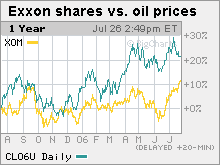Exxon Mobil makes more than $10 billion No. 1 U.S. oil company earns $1,318 a second - topping forecasts - but comes in just shy of a record. NEW YORK (CNNMoney.com) -- Profits at Exxon Mobil surged 36 percent to a near record $10.4 billion in the second quarter as surging oil prices helped the world's largest publicly traded company soundly beat Wall Street forecasts. The company's profit - which amounts to a cool $1,318 a second - is the second biggest ever reported by a U.S. company, behind only the $10.7 billion Exxon itself earned in the fourth quarter of 2005.
The earnings equaled $1.72 a share, topping the $1.64 a share analysts had forecast on average, according to First Call. Total revenue in the quarter was just a bit more than $99 billion. Exxon (Charts) shares rose modestly in afternoon New York Stock Exchange trading. The $1,318 a second would buy enough gasoline, even at the current $3 a gallon national average, to drive a Hummer H3 between Los Angeles and New York three times. One analyst said Exxon's record fourth-quarter earnings in 2005 included a $400 million tax charge that analysts were not including as part of that quarter's profit. "Apples to apples, this quarter is the highest by any organization ever," said Fadel Gheit, an energy analyst at Oppenheimer. Irving, Texas-based Exxon Mobil caught considerable flak from the general public for its record fourth quarter, which came soon after gasoline prices hit record highs. Compounding matters, the company gave its outgoing CEO Lee Raymond a retirement package worth about $350 million around the same time. That combination of events led to a public outcry calling for restrictions on CEO pay and calls from lawmakers who wanted to institute a windfall profits tax on the oil industry or even break up some of the oil giants that merged in the 1990s. But the industry says that oil prices fluctuate widely over time and that, in the long run, it's actually less profitable than a number of other industries. Officials have also argued against a government-forced breakup, saying oil companies need to be big to compete in a global market against foreign state-run firms, some of which are larger than Exxon Mobil. Surging oil prices helped Exxon in the second quarter, when crude prices jumped 31 percent. Exxon said spending on exploration and production rose 8 percent in the quarter, to $4.9 billion, while overall output rose 6 percent. Investors have been concerned that high oil prices would lead the company to boost spending even further. But the desire to restrain spending may run counter to consumer's interests, as more oil on the market would help lower gas prices. Gheit said the company sent $7.9 billion back to shareholders in the second quarter in the form of dividends and stock buybacks. He said Exxon's expenditures on exploration and production were sufficient, as most of the world's oil reserves are by now widely known. Extracting those reserves, he said, is constrained more by politics than it is by lack of spending on exploration. "They can't just go and push [Russian President Vladimir] Putin and say, 'let us in,'" he said. "They need access to resources, what can they do?" Gheit thought the company was striking a good balance with how it is spending its cash. When asked about investing in renewable energy technologies, an Exxon official said that, apart from ethanol, it's generally not part of the company's plan. "There are very few that are economical without subsidies," said Henry Hubble, vice president for investor relations, on a conference call. "We don't think it makes sense to invest in it at this point." The company's mammoth earnings, and its reluctance to get into the alternative energy market, drew fire from critics. Shawnee Hoover, director of Exxpose Exxon, a coalition of groups including Greenpeace and the Sierra Club, said Exxon will continue to post record profits until consumers have other energy choices. "Exxon wants to preserve [its] market by not doing anything about global warming," Hoover said on a conference call. Industry experts say that it's becoming increasingly expensive for oil companies to get easily refinable crude oil out of the ground. At the same time, high prices have led to surging demand for exploration and drilling equipment and workers, causing the price of such services to jump at least 15 percent a year over the last several years, industry executives and analysts say. Then there's the geological fact that new, large, high-quality oil fields are simply getting harder to find. Meanwhile, new production hasn't kept pace with surging demand - not only from the United States but from China, India and other rapidly growing economies - which has driven prices up nearly fourfold, from around $20 a barrel in early 2002 to a trading high of $78.40 earlier this month on the New York Mercantile Exchange. Tensions in the Middle East and other parts of the world and speculative buying by big investment funds have also helped fuel the run-up. |
| |||||||||||||||



